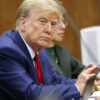It is past the time that Washington will be able to find a means to resolve the confrontation with Iran that is “all gain, no pain.”
And it should be clear that the fault for this lies clearly with the rulers in Tehran. They have become the single greatest obstacle to peace in the region and bringing freedom, peace, security, and prosperity to their own people. They have directed terrorist acts against other nations, including the Unites States. They have threatened to destroy other countries, including the U.S. They have put their own people at risk by bringing on themselves the enmity of other nations.
On the other hand, for its part, no nation has done more to make the world safe for the Iranian people than the U.S. In the late 1980s, Iran was surrounded by enemies—the Soviet Union, Saddam Hussein, and the Taliban. No nation did more to bring about the downfall of these regimes than the U.S., and no outside nation has done more for the peoples of the Middle East. The U.S. restored the territory of Kuwait, deposed Saddam, and stopped a surge of violence in Iraq that saw the widespread slaughter of innocents.
These are concrete statements of sacrifice made by Americans—to protect ourselves and our interest, for sure, but done in partnership with other nations in the hope of bringing liberty and prosperity to all.
In short, make no mistake: The government of Iran is its own worst enemy.
U.S. strategy toward Iran should begin by being unequivocal in recognizing Israel’s inherent right of self-defense. If the Israelis choose to act, they should know not only that the U.S. supports them but that the U.S. will help them defend against an Iranian attack. Furthermore, the U.S. should warn Iran that if it takes any action against the U.S., we will defend ourselves and take a strong and appropriate response. This unequivocal statement of support is the strongest possible deterrent against Iran acting against the U.S.
At the same time, the U.S. should pursue an integrated package of political and economic measures to bring freedom to the people of Iran. What is needed is an Iranian government that sincerely does not desire nuclear weapons.
There is a role for diplomacy—but not as an excuse for inaction, vague commitments, or the opportunity for Iran to play “rope-a-dope.” Simply arguing to “give diplomacy time to work” is no basis for a strategy at all.
What is the proper role of diplomacy? Tehran should always be given the opportunity to dismantle its weapons programs and undertake an orderly transition of power to a peaceful and legitimate government. But to be clear, diplomacy is not the primary tool for resolving this crisis; it is a lifeline to the regime, offering them a way to mitigate the suffering and danger to the people of Iran. In short, to talk its way out of this situation, Tehran should take significant, dramatic, and verifiable steps before taking any reciprocal action.
Any American strategy should also acknowledge that in any crisis, all sides get a vote and that Tehran will seek to mitigate the impact of sanctions while trying to run out the clock and become an established nuclear power—because then the clock starts over.
In the end, Israel may not act or the regime may not fall before Iran becomes an established nuclear power. Then the U.S. will face a different set of circumstances. Both Republican and Democratic Presidents have stated that a nuclear-armed Iran is unacceptable. The U.S. has to have a robust military presence in Europe and the Middle East to act on that conviction.
Some may believe that such a conviction might encourage Israel to simply “sit on its hands” and let the U.S. do it. Be that as it may, if Iran can threaten the U.S. by having nuclear weapons and the means to deliver them against the U.S. or its allies (and since the regime has threatened us), then we will be forced to act in self-defense. That response would be “strong and appropriate.”
We reserve the right to make that decision once we are convinced that Iran is near the point of no return.
Right now, the most important task is that the U.S. build up a range of robust military capabilities to deal with a variety of contingencies. (Conflicts never go as planned, and you can’t assume that a simple surgical strike will be the answer.) George Marshall said it best: “To preserve peace, prepare for war.”
Finally, Iran might as a last measure attempt to check-mate the U.S. by obtaining assurance of protection from other armed nuclear powers. To deal with this and similar threats, the U.S. needs to adopt a protect-and-defend strategy—including both a robust nuclear deterrent and strong missile defenses.
There are no easy answers—and while many Americans may be wary of confrontation, they should remember that liberty and freedom always carry with them the burden and obligations to protect them.
A clash of arms is always the last course of action—but the best way to avoid conflict is to be clear-eyed and realistic about the challenges being confronted and leaving no doubt over the resolve to act in your own self-defense.
























